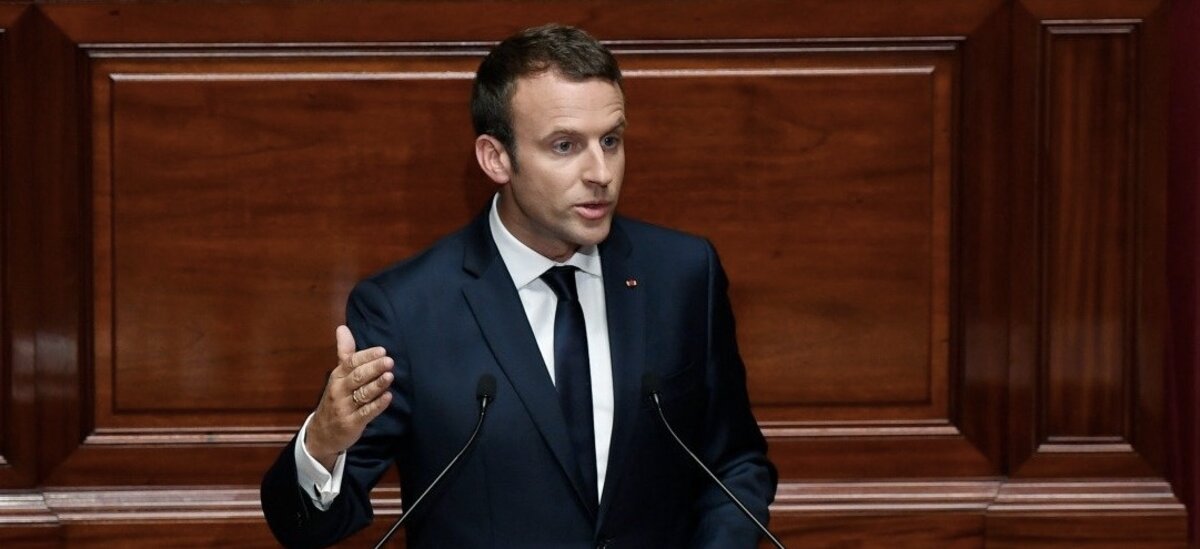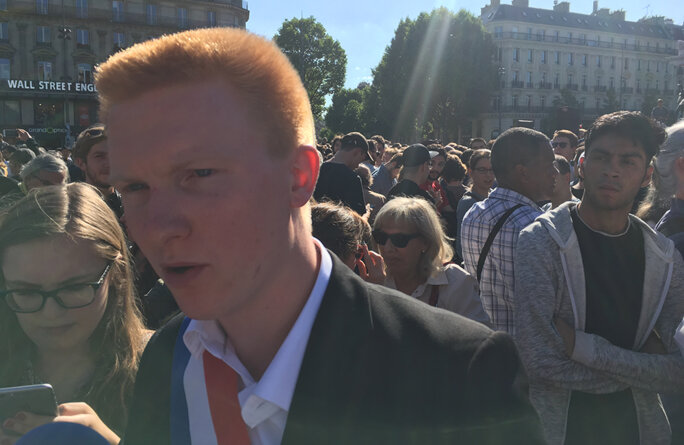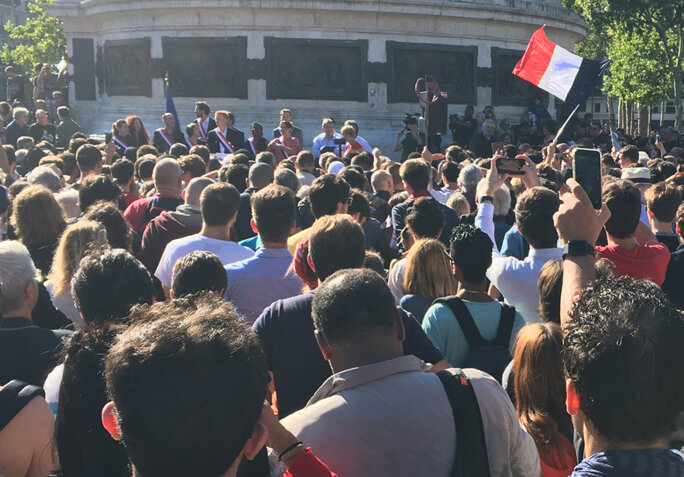There was lots of gilding, solemnity and excitement. And then … nothing. On Monday July 3rd, addressing members of his government and of both chambers of the French Parliament in the grand setting of Versailles, President Emmanuel Macron served up what amounted to little more than a very long campaign speech. For an hour and a half the new president simply repeated what he had said many times over, first in his book 'Révolution' and then at every meeting and in every interview during his election campaign. “Under article 18 the Constitution allows the President of the Republic to speak before the Parliament that has gathered for this purpose in a Congress,” he stated at the start of his speech. “There are times when this possibility becomes a necessity. The times we are living through now is one of those occasions.” Indeed, one might reply: but it still requires the speech that follows to live up to such a ceremonial occasion.
Yet whether it was on parliamentary reform, European reform, or what he calls “French intelligence”, Emmanuel Macron announced nothing new. In relation to institutional reform, for example, it had all been announced already: the desire to cut the number of Parliamentarians by a third, to limit how long Parliamentarians can serve and the introduction of a measure of proportional representation. At least they are no longer campaign promises any more, but promises made before the Congress. “I want all the transformations ...to be completed in a year and for us to guard against half-measures and cosmetic adjustments. These reforms will be submitted to a vote in Parliament but if necessary I will resort to a vote by our fellow citizens in a referendum,” he said, picking up an idea that his former justice minister and election ally François Bayrou had unveiled in June.
By adopting such a timetable the president gives himself a chance to regain control over public opinion in a few months, after an autumn that looks as if it could be marked by social protests. With a reform that has been demanded for several years and which will need new electoral boundaries, the head of state can also hope to keep on board local elected representatives who will negotiate the shape of their constituencies.

Enlargement : Illustration 1

But apart from this announcement, no other timetable was laid out, not even on the lifting of the state of emergency. For though the news alert “Emmanuel Macron announces that the state of emergency will be lifted in the autumn” arrived on people's smart phones, Macron in reality had announced nothing new at all. We have known since the end of May that the government would table legislation this July to end the state of emergency on November 1st, along with another bill aimed at transferring some of its measures into common law.
The president also went over the legislation aimed at restoring trust in public life; the debate on that starts in the upper chamber, the Senate, on July 10th. He said he wants to tackle “opacity”, “clientelism” and “conflicts of interest”. In short, he is targeting “everything that relates to commonplace, almost imperceptible corruption”.
But at the same time Emmanuel Macron issued a curious warning to journalists, who have already been urged by the president's spokesman Chrisophe Castaner not to “seek to weaken” the employment minister Muriel Pénicaud, who has come under fire for her role in a controversy involving Business France, which promotes French business interests abroad. In his Versailles speech Macron said: “The government legislation will be voted through, I have no doubt. But once it is I appeal for restraint, to end this unending search for scandal, with the permanent violation of the presumption of innocence, with these manhunts in which reputations are sometimes destroyed. This frenzy is unworthy of us and the republic's principles.”
Once again, the president's address was no different from his campaign speeches. On several occasions he took off on flights of fancy that sounded serious but which became rambling. Indeed, this meant that the direction or “course” that the president wanted to chart got lost within abstruse formulations such as “reality is pluralist, life is pluralist”. Quoting French historian Fernand Braudel and intellectual Georges Batalille was not enough to breath life into a speech that was padded out with clichés. “Interminable rain of truisms at Versailles,” said radical left MP Jean-Luc Mélenchon, whose France Insoumise ('Unbowed France') group boycotted the event, on Facebook. “Empty, pompous, boring,” tweeted Éric Ciotti of the conservative Les Républicains.
Unsurprisingly, the MPs from Macron's La République en Marche (LREM) ('The Republique on the Move') were won over by the speech delivered by their boss, to whom they naturally owe everything, starting with their elections to the National Assembly. They even applauded twice during this long speech, though it was not immediately clear what had suddenly stirred them to do so.
Emmanuel Macron, who had been criticised beforehand for his decision to speak on the eve of his prime minister's traditional speech outlining government policy in the National Assembly, insisted that it was not for him to “set out the government's actions, as some like to fear or hope”. In fact, rather than undermining Édouard Philippe, Macron's speech left the field open for his prime minister's keynote speech in the Assembly on Tuesday July 4th.
Away from the Versailles Palace the radical and hard left held gatherings. Outside the town hall in Versailles around 15 communist MPs and around 150 supporters gathered to hear the French Communist Party's secretary general Pierre Laurent say he was there to “protest against the president of the Republic's decision to accelerate the presidentialisation of the regime”.
Les parlementaires et militants communistes rassemblés à Versailles pour dire non à la monarchie présidentielle #congres pic.twitter.com/FgJoInjncl
— Pierre Laurent (@plaurent_pcf) July 3, 2017
Later in the afternoon it was the turn of MPs from Mélenchon's movement to gather, this time at Place de la République in Paris. Caroline Fiat, an MP from north-east France, picked up on recent comments by Emmanuel Macron who had appeared to speak of people “who are nobodies”. To applause she said: “We the nobodies are going to make a lot of noise and show him that lots of little nobodies add up to a lot.” Jean-Hugues Ratenon, an MP from the French overseas territory of La Réunion, said the comments had been “unworthy” of a president and promised people would “resist”, claiming that the president wanted to “install social apartheid in France”.

Enlargement : Illustration 4

France Insoumise MP Adrien Quatennens from the north of France (see above) told Mediapart that he had been too busy to listen to Macron's speech and that his group were drawing up amendments to planned legislation which will give the government the right to change labour law by decree. They have laid down 132 of the 200 proposed amendments so far. “We're going to try to restrict the government's room for manoeuvre,” he explained. “The French people are going to discover that the world of social rights has been changed during their holidays and it's up to us to open their eyes.”

Enlargement : Illustration 5

The movement's leader Jean-Luc Mélenchon attacked what he called three “coups” against the established order carried out by the president. The first was the fact that the president had chosen to deliver his address before his prime minister had even received the traditional vote of confidence for new governments in the National Assembly. The second was the plan to use decrees to change employment law and the third was the proposal to transfer some measures from the state of emergency into common law. He also attacked the plans to reduce the number of MPs. “You don't have too many MPs, you don't have enough,” he told the crowd, promising another protest on July 12th, the day the Assembly votes on the plans to allow decrees to be able to change employment law.
The French president has had the right to address both chambers of Parliament at a special Congress since the constitutional reforms of 2008. President Nicolas Sarkozy made use of his own reform in June 2009 to announce the launch of a National Loan and a law to ban the wearing of a full veil. His successor President François Hollande also addressed a Congress at Versailles two days after the terrorist attacks in Paris in November 2015 to set out a series of measures aimed at combating terrorism. These included the ultimately abandoned plan to strip French nationality from dual nationals convicted of terrorist offences.
In contrast, Emmanuel Macron chose to address Congress for no obvious reason, other than perhaps to avoid having to take part in the traditional Bastille day interview by journalists, a format which according to his aides does not suit the development of his “complex thought processes”. He also told his audience on Monday: “I will come back every year to report to you.” Once more this was in line with what he had said during the campaign when he made it clear he wanted to deliver the French equivalent of the annual 'State of the Union' speech delivered by American presidents to a joint session of the US Congress. Aides working for the new president of the National Assembly, François de Rugy, estimate the cost of this French version will be around 200,000 euros a year.
---------------------------------------------------------------------------
- The French version of this article can be found here.
English version by Michael Streeter


